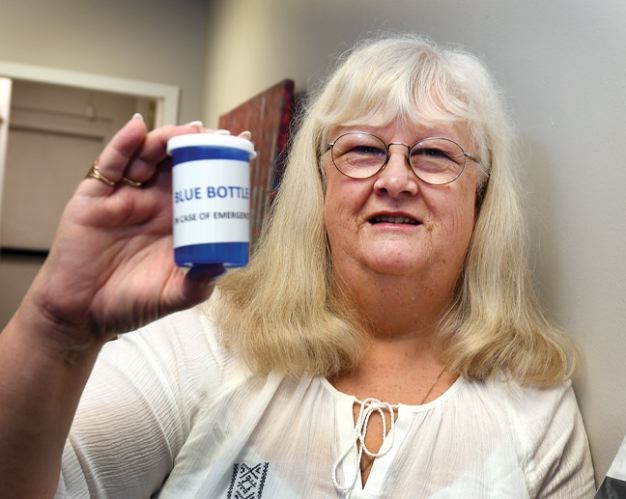Many seniors take several types of prescription medication but not all seniors know why they are taking them or what side effects they may cause.
To help seniors become better informed about their prescriptions, Lola-Dawn Fennell, general manager at the Prince George Council of Seniors, offers a presentation called Medication Awareness, developed by the council of senior citizens organizations of British Columbia.
"They have individuals trained to do health and wellness workshops all over the province," said Fennell.
The Medication Awareness presentation is especially important because more than half of B.C. seniors take three to six different medications.
"Which is really alarming," said Fennell.
These medications can include prescription drugs, over the counter drugs, vitamins, herbal products or laxatives.
"There's a lot that you need to be aware of because even foods can react to certain medications," said Fennell. "This presentation doesn't try to make everybody aware of everything, the premise of it is take charge of your own medication. Be aware of what you're taking, why you're taking it and what the possible side effects could be."
More than half of seniors do not take their medications correctly, she added.
"They may take too much, they may take too little, they may skip doses, or like my grandma, have a nap and get up and think it's the next day and take their meds again," said Fennell. "They may not follow instructions, forget instructions or they may take somebody else's medication and it's also possible that they may be prescribed or given the wrong medication because doctors and pharmacists are human, too."
Of seniors on medication, 60 per cent or more cannot name the medication they are taking.
"So if you ask them what they take, they'll probably say something like 'well now let me see, I take the pink pill in the morning and the yellow pill I take with my lunch, no, no that's not right, I take the yellow pill in the morning and the pink one with my lunch," said Fennell. "But they don't know the names of the medication or what they are for and that's really part of a senior's responsibility to develop a two-way relationship with their doctor and pharmacist."
It's important to know those things, she added.
"We know that more than 4,000 Canadians die annually because of medication misuse," said Fennell. "And we're not talking about fentanyl or intravenous drugs. We're talking about every-day prescription drugs."
A senior might not be able to read or understand instructions, they may not be able to see the label on the medication, they probably believe medical experts know best and don't question why they are taking the prescription. sight, hearing or memory problems can also contribute to the problem.
"So the doctor or pharmacist may have gone over the correct use of the medication but the senior didn't hear it or didn't absorb that information," said Fennell. "There's also limited drug testing on seniors."
Most testing is done on university age people while older livers and older kidneys do not process medications the same way as young organs do, she added.
"So seniors tend to be way more sensitive to some drugs," said Fennell.
Possible side effects of medication are often not explained to the patient.
During the presentation, Fennell imparts a few important facts that seniors need to know.
"It starts with questions seniors should be asking their doctor when prescribing a medication," said Fennell. "Ask what the problem is, what's it caused by, how did I get it, could it be something else, can I expect other symptoms, is it contagious, how long might I have this problem and what can be done about it and how can I prevent it from happening again - and that's before ever taking the medication."
More specifically about the medication, a senior needs to know the name of it, if there are generic forms that are less expensive, why is it being prescribed, how does it work, how long to take it, what are the exact instructions, and should the patient avoid eating certain foods or avoid other medications while taking it.
"So again it goes back to the two-way relationship you have with your doctor and your pharmacist," said Fennell. "So we suggest people who have been on a number of medications for sometime to go discuss all of their meds with their doctor or their pharmacist on an annual basis."
To help offset the steep cost of some medications for those with low incomes, they can register for PharmaCare by calling 1-800-663-7100 or visit www.gov.bc.ca/pharmacare.
Seniors may also want to take advantage of the free local Blue Bottle Program, which provides a kit for people to record information that's critical to emergency personnel when there is a health crisis that finds the person unable to relay that information themselves. All pertinent information is filled out on a form and stored in the Blue Bottle, which is then put in the freezer compartment of the refrigerator. There's a sticker on the fridge and the main door to the home indicating to first responders where to find the information. Seniors can pick up the kit at the Prince George Council of Seniors, 721 Victoria St., Hart Drugs, 6707 Dagg Rd., or Evergreen Pharmacy, 1467 Third Ave. and the Phoenix Dispensary,103-2155 Tenth Ave.
To make a request to have the Medication Awareness workshop presented to your group, call Fennell at the PGCOS at 250-564-5888.



